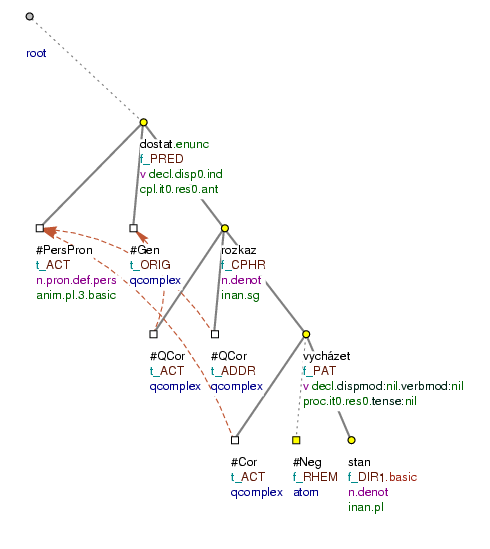- Definition of the
CPHRfunctor -
The functor
CPHR(compound phraseme, or a part of compound predicate) is a functor for the nominal part of multi-word predicates and for the non-verbal part of quasimodal verbs consisting of the verb být (=to be) and a predicative adverb.
See Section 9.3, "Complex predicates" for more on multi-word predicates. For more on quasimodal verbs consisting of the verb být (=to be) and a predicative adverb see Section 2.1.3, "Copula "být" (verbonominal predicate)".
The expression represented by the node with the functor CPHR constitutes one multi-word lexical unit together with the verb represented by the parent of this node, while the main lexical meaning of the whole unit is carried by the node with the functor CPHR.
Forms. The expression represented by the node with the functor CPHR is:
-
(usually deverbal) noun.
Examples:
Dostali rozkaz.
CPHRnevycházet ze stanů. (=They received a command not to leave their tents.) Fig. 7.47Učinil rozhodnutí.
CPHR(=He made a decision.)See Section 9.3.1.2, "Properties of the nominal component of complex predicates" for more.
-
predicative adverb.
Example:
Je třeba.
CPHRodejít. (=It is necessary to leave.)See Section 2.1.3, "Copula "být" (verbonominal predicate)" for more.
Figure 7.47. The CPHR functor

Dostali rozkaz nevycházet ze stanů. (=lit. (They) received a_command not_to_leave - tents.)
Borders with the functor DPHR. The functors CPHR and DPHR often compete. The decision which of the functors should be assigned to the node is closely related to the borders between individual types of multi-word predicates. For more on this see Section 9.4, "Borderline cases with multi-word predicates".